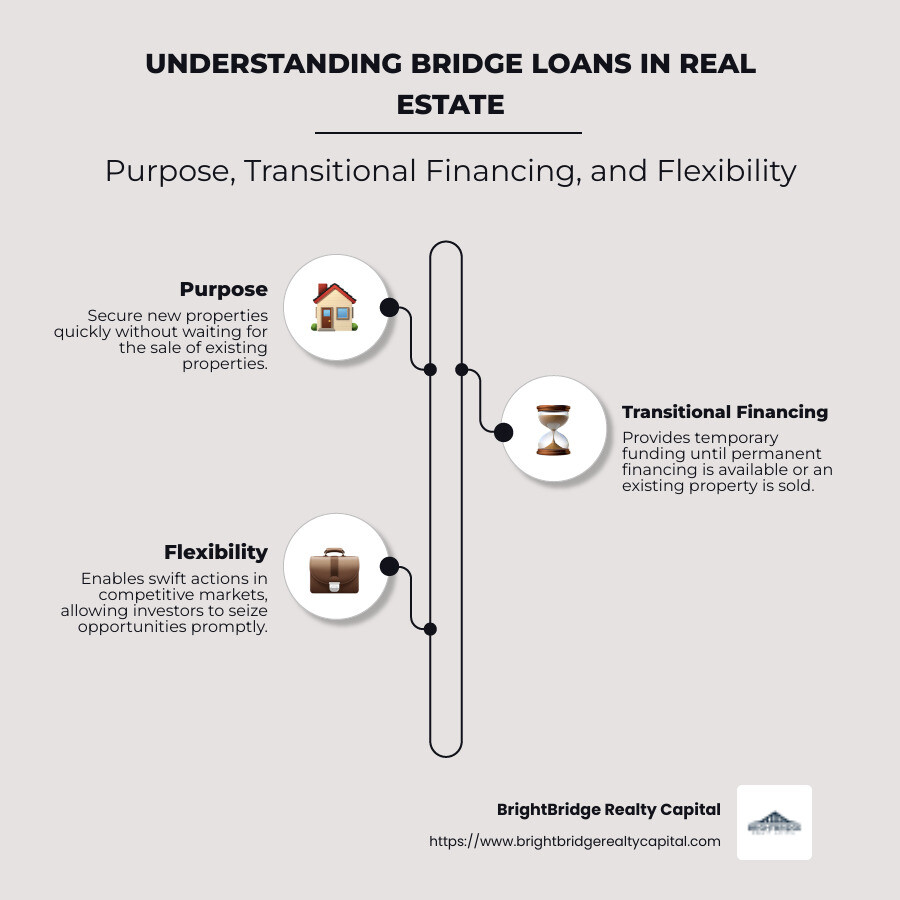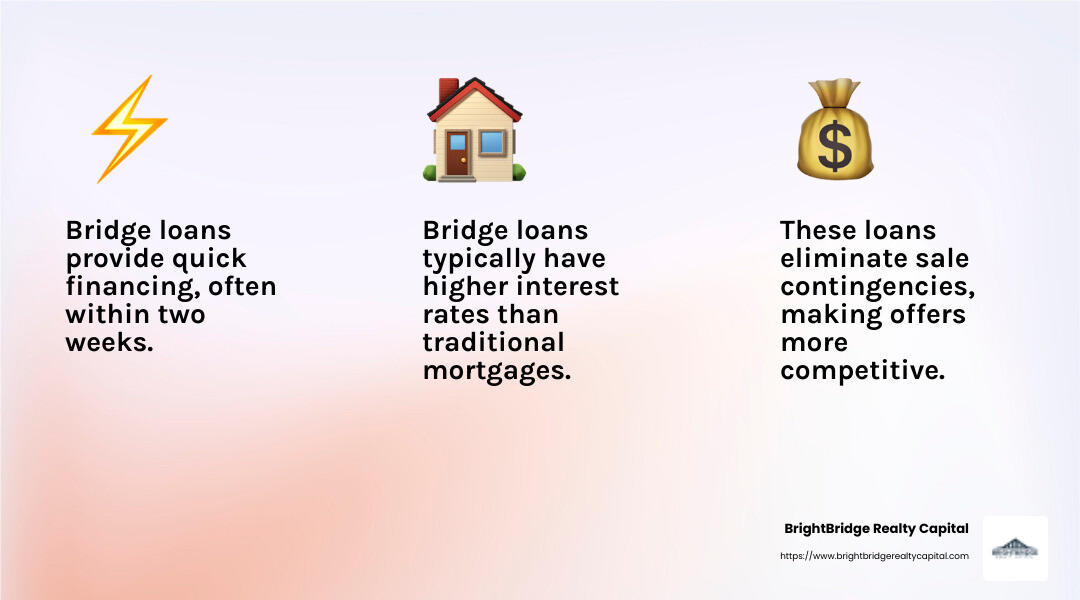Bridge Loans in Real Estate: A Comprehensive Guide

Bridge loans real estate are swift, short-term financing solutions for real estate investors in transition. These loans bridge the financial gap when buying a new property before the sale of an existing one is complete. Whether you're a fix-and-flip investor or expanding your rental portfolio, bridge loans offer vital liquidity at a crucial time.
- Purpose: They allow investors to quickly secure new properties without waiting for existing properties to sell.
- Transitional Financing: Bridge loans provide temporary funding and are typically repaid when permanent financing is in place or when the original property sells.
- Flexibility: They offer the agility to move fast in competitive markets, making it possible to seize investment opportunities without delay.
Bridge loans are a strategic tool, especially in real estate markets like New York, where timing is everything. Before diving in, understanding the benefits and risks of bridge loans is essential for making informed decisions.

Simple guide to bridge loans real estate:
What is a Bridge Loan?
A bridge loan is a short-term loan designed to provide immediate cash flow during transitional periods. Often referred to as gap financing or swing loans, these loans are crucial for real estate investors who need to act quickly.
Short-Term Loan
Bridge loans are temporary, typically lasting between six to twelve months. This short duration is ideal for covering costs while waiting for long-term financing or the sale of an existing property. The key advantage of a bridge loan is its ability to offer rapid financial support, enabling investors to seize opportunities without delay.
Gap Financing
Think of bridge loans as a financial bridge. They fill the gap between buying a new property and securing permanent financing or completing the sale of an existing one. This is particularly beneficial in hot real estate markets, where properties can move quickly. By having access to a bridge loan, investors can make competitive offers without the contingency of selling their current home first.
Swing Loans
Sometimes called swing loans, bridge loans offer flexibility. They allow you to "swing" from one property to another without the financial strain of waiting for a sale to close. For instance, if you find a perfect investment property but haven't sold your current one, a bridge loan lets you make the purchase with confidence.
Bridge loans are a strategic option for real estate investors needing quick access to funds. Whether you're expanding your rental portfolio or diving into a new project, understanding how these loans work can make all the difference in your investment journey.
How Bridge Loans Work in Real Estate
Bridge loans are all about helping you manage cash flow during transitions in real estate. They offer a way to tap into the equity of your current home to secure a new property, even if your existing home hasn't sold yet.
Bridge Loan Use Options
Cash Flow and Equity Usage
Bridge loans provide immediate cash flow by leveraging the equity in your current home. This means you can use the value of your existing property as a financial springboard to purchase a new one. By doing so, you can make swift moves in the market without waiting for your old home to sell.
Collateral
Your current home typically serves as collateral for the bridge loan. This means the lender has a security interest in your property, which helps them offer you the loan even if you haven't sold your home yet. It's like having a safety net that assures the lender you have skin in the game.
Second Mortgage
One way to use a bridge loan is as a second mortgage. This option allows you to borrow against the equity of your current home to make a down payment on a new property. This means you can secure your dream home without waiting for the sale of your existing property to go through.
Pay Off Old Mortgage
Alternatively, you can use a bridge loan to pay off your old mortgage entirely. This option is especially useful if you want to eliminate the existing mortgage debt on your current home. By doing so, you can focus on your new purchase without the burden of two separate mortgages.

Bridge loans in real estate offer flexibility and speed, making them a valuable tool for investors and homeowners. Whether you're using it as a second mortgage or to clear an old debt, understanding these options can help you steer the complexities of buying and selling homes simultaneously.
Pros and Cons of Bridge Loans
When it comes to bridge loans real estate, understanding the pros and cons is crucial. These short-term loans offer both advantages and disadvantages that can impact your financial journey.
Pros of Bridge Loans
Quick Financing
One of the biggest advantages of bridge loans is the speed at which funds are made available. In real estate, timing is everything. Bridge loans can provide cash in hand quickly, sometimes in as little as two weeks. This rapid access to funds allows you to act fast in competitive real estate markets.
No Sale Contingency
Bridge loans can eliminate the need for a sale contingency in your offer. This means you don't have to wait to sell your current home before buying a new one. Without a sale contingency, your offer becomes more attractive to sellers, giving you a competitive edge.
Competitive Offers
In hot markets, making a strong offer is key. By using a bridge loan, you can make offers that aren't contingent on selling your current home. This flexibility can make your offer stand out among others, increasing your chances of securing the property you want.
Cons of Bridge Loans
High Interest Rates
While bridge loans offer quick access to funds, they come at a cost. These loans typically have higher interest rates compared to traditional mortgages. This means you'll pay more over time, which can impact your overall financial strategy.
Dual Mortgages
Taking out a bridge loan often means you'll be juggling two mortgages at once. If your current home doesn't sell quickly, you could find yourself making payments on both your old and new mortgages. This dual financial burden can be challenging to manage.
Qualification Requirements
Securing a bridge loan isn't always easy. Lenders often require a strong credit score and a low debt-to-income ratio. Additionally, many lenders expect you to have at least 20% equity in your current home. These requirements can be a barrier for some borrowers.

Understanding the pros and cons of bridge loans can help you make informed decisions in real estate. While they offer quick financing and the ability to make competitive offers, the high interest rates and dual mortgage payments are important factors to consider.
Bridge Loans Real Estate: Key Considerations
When considering bridge loans real estate, there are a few key factors you need to think about. These include equity requirements, your credit score, and your debt-to-income ratio (DTI). Let's break these down.
Equity Requirements
To qualify for a bridge loan, most lenders require you to have at least 20% equity in your current home. This means if your home is worth $500,000, you should have at least $100,000 in equity. This equity acts as collateral for the loan, giving the lender confidence that you'll be able to repay the money.
Credit Score
Your credit score is another important factor. Many lenders look for a credit score of 740 or higher. A higher credit score suggests you're a reliable borrower who pays back loans on time. If your score is lower, you might face higher interest rates or even struggle to get approved for a bridge loan.
Debt-to-Income Ratio
Lenders also consider your debt-to-income ratio, which compares your monthly debt payments to your monthly income. Ideally, this ratio should be below 50%. A lower DTI indicates you have enough income to handle your current debts, plus the new bridge loan payments. If your DTI is too high, it might be difficult to qualify for a bridge loan or manage the payments.
These key considerations—equity, credit score, and DTI—are essential when exploring bridge loans in real estate. They help determine your eligibility and the terms of your loan. Keep these in mind as you plan your real estate financing strategy.
Customized Bridge Loan Solutions by BrightBridge Realty Capital
At BrightBridge Realty Capital, we understand that every real estate investor's journey is unique. That's why we offer customized bridge loan solutions custom to meet your specific needs.
Custom Financing
Our approach to financing is all about flexibility. We know that your investment strategy might involve anything from flipping properties to building a rental portfolio. That's why we offer a variety of loan options to fit your goals. Whether you need a short-term bridge loan or something more specific, we're here to help you get the funding you need.
Expert Guidance
Navigating real estate financing can be complex. That's where our team of experts comes in. We provide personalized guidance throughout the entire loan process. From the initial application to the final payoff, we're dedicated to ensuring you have the information and support you need to make informed decisions.
Client-Focused Approach
Our client-focused approach means we put your needs first. We pride ourselves on our fast closing process, often committing the same day and helping customers close within one week. This ensures you can move forward with your real estate projects without delays. Our team manages every detail in-house, providing a seamless experience from start to finish.
With BrightBridge Realty Capital, you're not just getting a loan—you're getting a partner in your real estate investment journey. Our customized solutions and expert support are designed to keep your projects on track and your investment strategy moving forward.
Frequently Asked Questions about Bridge Loans
What are the typical interest rates for bridge loans?
Bridge loans often come with higher interest rates compared to traditional mortgages. These rates typically range from the prime rate to the prime rate plus 2 percentage points. The Annual Percentage Rate (APR) can vary based on the lender and your creditworthiness. It's crucial to consider these rates when calculating the overall cost of a bridge loan.
How long does it take to close a bridge loan?
One of the main advantages of bridge loans is their fast approval and quick funding. At BrightBridge Realty Capital, we pride ourselves on our efficient closing process. Often, we can commit to a loan the same day and help you close within a week. This speed is essential for real estate investors who need to act quickly in competitive markets.
What happens if my home doesn't sell before the bridge loan term ends?
If your home doesn't sell before the bridge loan term ends, you might face the challenge of managing dual mortgages. This situation can strain your finances, so it's important to have a financial plan in place. Consider setting aside additional funds or exploring refinancing options. Engaging in risk management strategies will help you steer this scenario without jeopardizing your financial stability.
Conclusion
In the world of real estate, timing is everything. That's why at BrightBridge Realty Capital, we specialize in providing customized bridge loan solutions that are custom to your unique needs. Whether you're flipping a property, developing new construction, or expanding your rental portfolio, our team is here to support you every step of the way.
What sets us apart? It's our commitment to fast closings. We understand that opportunities in real estate can disappear in the blink of an eye. Our streamlined process ensures that you can secure funding quickly—often within just one week. This speed can be the difference between winning or losing a deal in competitive markets.
Our client-focused approach means that we work closely with you to understand your goals and provide flexible financing solutions that fit your strategy. With direct lending and no intermediaries involved, we offer competitive rates and a seamless experience from start to finish.
Explore how BrightBridge Realty Capital can help you bridge the gap in your real estate investments. Learn more about our services and find the difference that personalized, fast, and flexible financing can make for your investment strategy.


